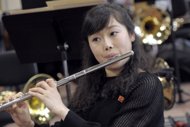N.Korean orchestra opens musical bridge to Europe

The musicians played with the Philharmonic Orchestra of Radio France under the baton of South Korean maestro Myung-Whun Chung who called the event a "family concert".
For the first time in his life, he said, he had got to know another part of his "family" -- North Korean musicians of the Unhasu Orchestra who had come to play with his "French family" from Radio France.
Despite the death of North Korean dictator Kim Jong-Il in December and Pyongyang saying this month it would suspend its uranium enrichment programme in return for US food aid, tensions remain high.
"There are two Koreas politically. But humanly speaking, we're a family," Chung declared, adding that "music is bigger than borders."
Besides Estonia, France is the only European country not to have diplomatic relations with North Korea, one of the most closed societies in the world. But last autumn a French cooperation office was set up in Pyongyang to act in the cultural and humanitarian fields.
The Unhasu musicians, who arrived Saturday from the North Korean capital, and those of the French orchestra gave a stirring performance of Brahms' Symphony number 1.
In the first part of the concert the 75 Unhasu musicians with two conductors offered pieces from North Korea's traditional repertoire, including an item for the haegum, a kind of small violin held on the knees, and the kayagum, something like a zither. They were performed by two young North Korean women in flowing pink dresses.
Then violinist Mun Kyong Jin played the "Rondo Capriccioso" for violin and orchestra by Camille Saint-Saens on a 1716 Stradivarius.
At the end of the concert the ensemble of musicians treated the audience to a special encore -- "Arirang", a song beloved by Koreans and which Chung dedicated to his mother, who was born in Pyongyang and died last year.
"Maybe up there she's really enjoying it," he joked.
A second encore from Bizet's "Carmen" conducted with evident joy by the maestro, was dedicated to France and to everyone who contributed to the concert.
South Koreans of all ages attended, but so did North Koreans, minders of the musicians and a few young students, recognisable from the badge they wore bearing the portrait of their leader.
"I've been trying to do this for 30 years," Chung said last week. "For practically all Koreans, outside the world of politics, there are not two Koreas, there's only one country, a family divided.
"I don't know a single Korean who doesn't want at least a rapprochement between the two Koreas, a normal situation, if not reunification."
Chung said it was "too early" to get the North Koreans to play German composer Beethoven's Ninth Symphony, which includes the "Ode to Joy", anthem of the European Union and one of the symbolic high spots of Western culture.
The South Korean pianist and conductor has been director of the Radio France orchestra since 2000 and since 2005 also the artistic director of the Seoul Philharmonic in his South Korean hometown.
The first crack in the wall appeared in September 2011, when former French culture minister Jack Lang opened the French cultural centre in North Korea.
Chung, in his capacity as the leader of a French orchestra, was finally allowed to visit and to meet two young orchestra leaders, one of whom had studied in Moscow, the other in Vienna.
He spent four days in the country -- normally largely closed to South Koreans -- and worked with two orchestras, including Unhasu, which was founded in 2009 and whose musicians have an average age of 20.
After the success of Wednesday's show, the maestro's next challenge will be to organise a joint performance of musicians from both Koreas before the end of the year.
What the stars mean:
★ Poor ★ ★ Promising ★★★ Good ★★★★ Very good ★★★★★ Exceptional
Related Contents
Latest News
More News
- Russian President congratulates Vietnamese Party leader during phone talks (January 25, 2026 | 09:58)
- Worldwide congratulations underscore confidence in Vietnam’s 14th Party Congress (January 23, 2026 | 09:02)
- Political parties, organisations, int’l friends send congratulations to 14th National Party Congress (January 22, 2026 | 09:33)
- 14th National Party Congress: Japanese media highlight Vietnam’s growth targets (January 21, 2026 | 09:46)
- 14th National Party Congress: Driving force for Vietnam to continue renewal, innovation, breakthroughs (January 21, 2026 | 09:42)
- Vietnam remains spiritual support for progressive forces: Colombian party leader (January 21, 2026 | 08:00)
- Int'l media provides large coverage of 14th National Party Congress's first working day (January 20, 2026 | 09:09)
- Vietnamese firms win top honours at ASEAN Digital Awards (January 16, 2026 | 16:45)
- ASEAN Digital Ministers' Meeting opens in Hanoi (January 15, 2026 | 15:33)
- ASEAN economies move up the global chip value chain (December 09, 2025 | 13:32)

 Tag:
Tag:




















 Mobile Version
Mobile Version